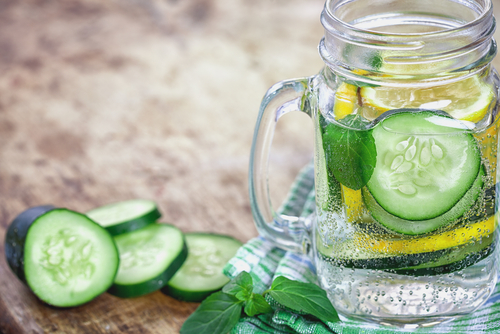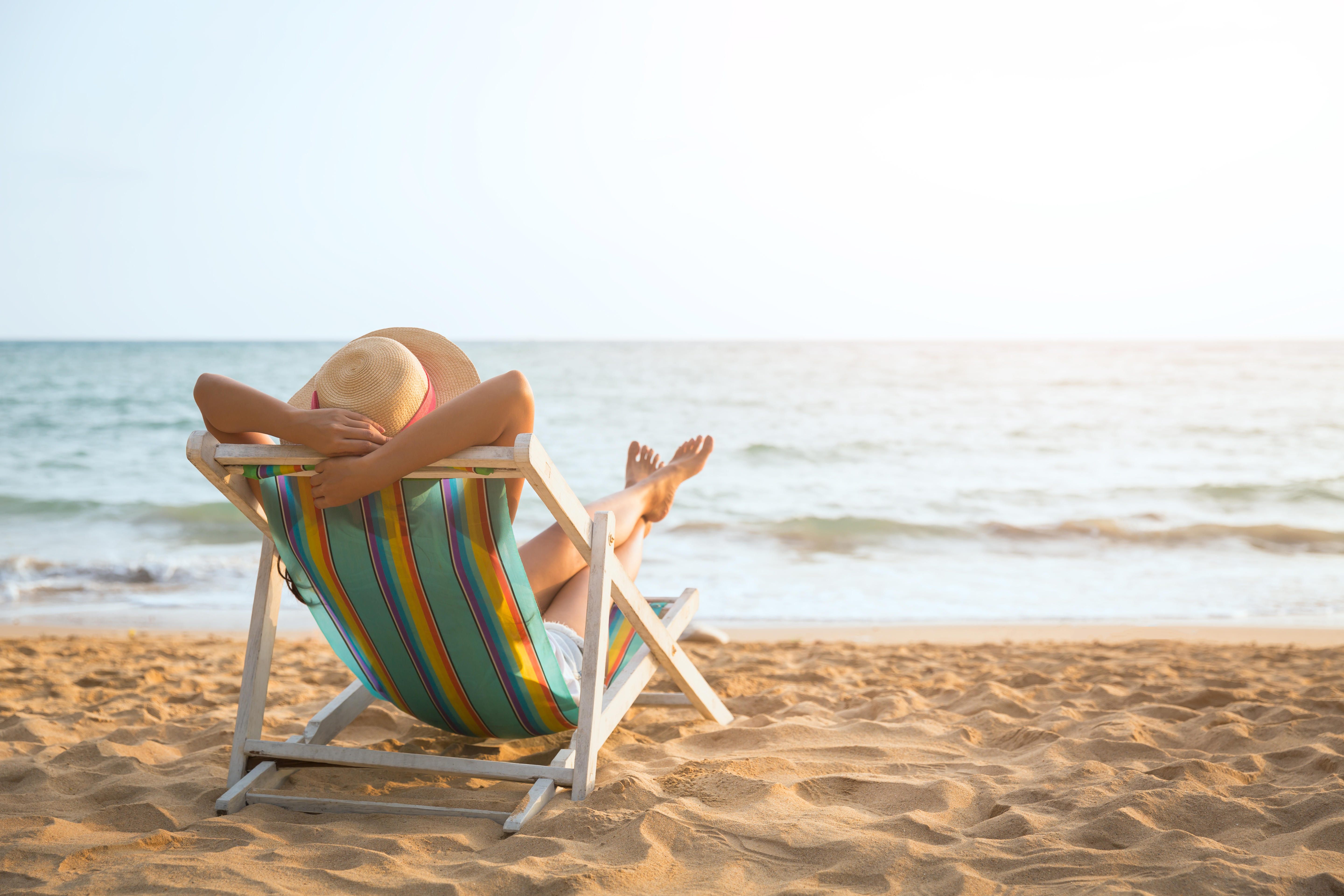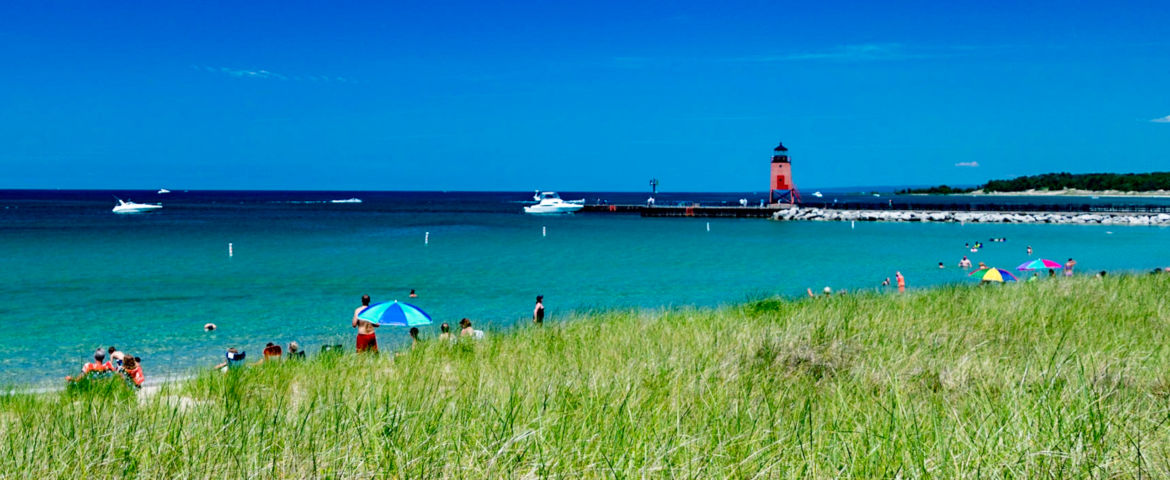By Kris Rich, NBC-HWC, CPT, CET
If you’re hitting up the 11,000-plus lakes in our very own Mitten state, there’s nothing like a great day at the beach to have you shouting “Long Live Summer!” To keep you enjoying each and every moment you have planned on the shore, here are our top 10 favorite tips to make sure your beach days are healthy and happy.
1. Love the skin you’re in.
Start with the obvious: sunscreen is a must for all beach days, even the cloudy ones. To protect against both UVA and UVB rays, wear a broad spectrum, water resistant SPF 30 sunscreen. It’s recommended adults and kids use an ounce of sunscreen for their entire body (equivalent to the amount held in a shot glass). Reapply after every two hours of sun exposure, or after swimming or sweating.
Applying sunscreen is also a great time to do a full body skin check and look for suspicious spots you might not otherwise notice since early detection is key in preventing skin cancer. The proper clothing, hats and shades matter too for sun protection—along with making some time for shade. Check out more tips here.

2. Walk everywhere.
If you’re going with a large group, chances are you’ll have a lot of stuff to cart out to the shore. Take advantage of this time to get in some extra steps. And as a sweet activity bonus, walking or running on deep, loose sand challenges your balance and engages more muscle fibers. This means you’ll burn 30% more calories than walking or running on a flat surface, even at the same speed.
To challenge yourself further, set up that umbrella and chair far from the bathrooms and other beach amenities, so you’ll have to walk more steps throughout the day. In Michigan, you can also schedule beach days at parks with extra hiking trails or even sand dunes to climb.
3. Make a splash.
Did you know when you’re inside Michigan’s borders, you’re never more than six miles from a body of water? Since you’ve got that suit on, don’t just stick to your towel or chair—get out there and get wet. Swimming works almost every muscle group in the body at one time and can help improve flexibility. It’s a great workout since swimming burns calories at a rate of about 3 calories a mile per pound of bodyweight. So if you weigh 150 pounds and it takes you 30 minutes to swim one mile, you’ll be burning about 900 calories in one hour. Plus, swimming has many benefits beyond just great exercise. A water workout can provide relief for chronic pain and can even have psychological benefits.

4. Mix up your workout.
Beyond the obvious swimming and walking, there are so many ways to get moving at the beach. If you’re bored with your daily workout, the sand is a great place to mix it up a little. Join a game of beach volleyball or Frisbee with the kids or try paddle boarding or skim boarding on the shore. Here’s a breakdown of how many calories you can burn with some common beach activities (note: these estimates are based on a 150 pound woman so boost these numbers if you’re male or weigh more):
- Building a Sandcastle: 100 calories per hour
- Fishing: 120-150 calories per hour
- Playing Frisbee: 175 calories per hour
- Boogie Boarding: 200-250 calories per hour
- Jumping Waves: 300 calories per hour
- Beach Racquetball, Badminton, and Paddleball: 300-450 calories per hour
- Ocean Kayaking: 350 calories per hour
- Beach Walking and Running: 330-800 calories per hour
- Swimming: 410 calories per hour
- Beach Volleyball: 500 calories per hour
5. Stretch and stretch some more.
Take advantage of your time in the sand by stretching those arms and legs. To maintain healthy, flexible and strong muscles, it’s important to stretch daily. Flexible muscles help your body maintain a greater range of motion in your joints. Stretching also reduces your risk for joint pain, strains and muscle damage when you do make use of your muscles. Strong, flexible muscles also lead to better balance and posture. Try these easy stretches you can do on your beach blanket or towel, or check online for planned yoga classes at a beach near you.
6. Hydrate, hydrate, hydrate.
While beaching it, make water your drink of choice. This calorie-free beverage is essential for numerous metabolic processes and helps prevent false hunger. Bring a reusable water bottle with you and set a goal to consume your daily fluid needs. A quick and basic calculation for estimating how much fluid you need is: half of your body weight (pounds) = fluid needs (ounces). So a 150 pound person would need 75 ounces of water per day.
Remember that in warmer weather, you’ll sweat more and therefore, need to replenish more often. Same thing with physical activity since you’ll need to compensate for the water lost while sweating. For a tropical twist and added flavor, infuse water with fresh fruit and herb combos like cucumber and mint or mango pineapple. Here are more pairing ideas.

7. Eat with your beach body in mind.
There’s nothing like hot weather and bathing suit season to bring on lighter meals. Keep an eye on the calorie intake, which can be hard to do relaxing on the beach when mindless eating can happen. If you find yourself reaching for food even if you’re not hungry, get up and get moving instead (see numbers 2 through 4 above.) You will need to eat throughout the day to replenish your energy though, so make to stock your beach bag with healthy, non-perishable snacks like protein bars, dried fruit or almonds. If you can swing adding a cooler to your gear, pack some fresh summer fruit, veggies and humus, light string cheese sticks or a healthy sandwich or salad. Here are some of our favorite summer picnic ideas. Try to avoid potato chips and other salt-ridden snacks that will make you even thirstier in the heat.
8. Detox from tech for a while.
With the glaring sun and lack of outlets, the beach isn’t the most technology-friendly place, and that’s ok—it can actually be good. Take the time for a little tech detox. It feels great to relax and enjoy the beautiful scenery without a phone or tablet, not to mention, all of those alerts interrupting your thoughts. It also means less to carry and more quality time with your family and friends—being present in the moment. Try turning off your phone and storing it away for a while in your beach bag. You’ll save precious battery life for the drive home. Of course, you may want to have it on hand to grab a great selfie or a photo of the waves to capture the fun of your day.

9. Sleep deep, or meditate.
Since you’re tech-free for a while and the sound of the waves can be so soothing, consider scheduling time for a light nap on the beach. According to the National Sleep Foundation, naps have numerous health benefits including boosting alertness, improving motor performance and helping to lower tension, which decreases your risk of heart disease. Optimal napping hours are between 1 and 3 p.m. after lunchtime, when your blood sugar and energy starts to dip. On the beach, this is also prime sun time so make sure to lather up with sunscreen and nap under an umbrella or other source of shade. If you’re not comfortable snoozing on the shore, try meditation. Begin and end the day on the beach by sitting at the edge of the waves, clearing your mind and breathing deeply, even if only for a few minutes. Try these meditation tips to help guide you.
10. Be Present.
Let’s face it, in Michigan our beach days are few each year. We really only have three months of hot summer weather—so make the most of your time at the beach. Connect with your family members or partner, get in the sand and play with kids and friends, smile at strangers. Maybe even offer to help your beach neighbors when their umbrella is blowing away or that sand bucket is floating down the shore. Turn off your phone and be present in the moment. You’ll find yourself feeling refreshed and ready to take on your normal routine, until your next beach day.
Inspired to hit the sand in a healthy new way? Consider trying a beach you’ve never been to before, and spend a day exploring a new Michigan town. This handy guide includes all of the best beach towns in Pure Michigan.
About the author: Kristina Rich, NBC-NWC, CPT, CET is a nationally-certified health and wellness coach at Priority Health. She works with members to help them develop a personalized plan for their own health and wellbeing based on what is realistic and beneficial. Kristina is also a certified personal trainer and cancer exercise trainer through the American College of Sports Medicine.


